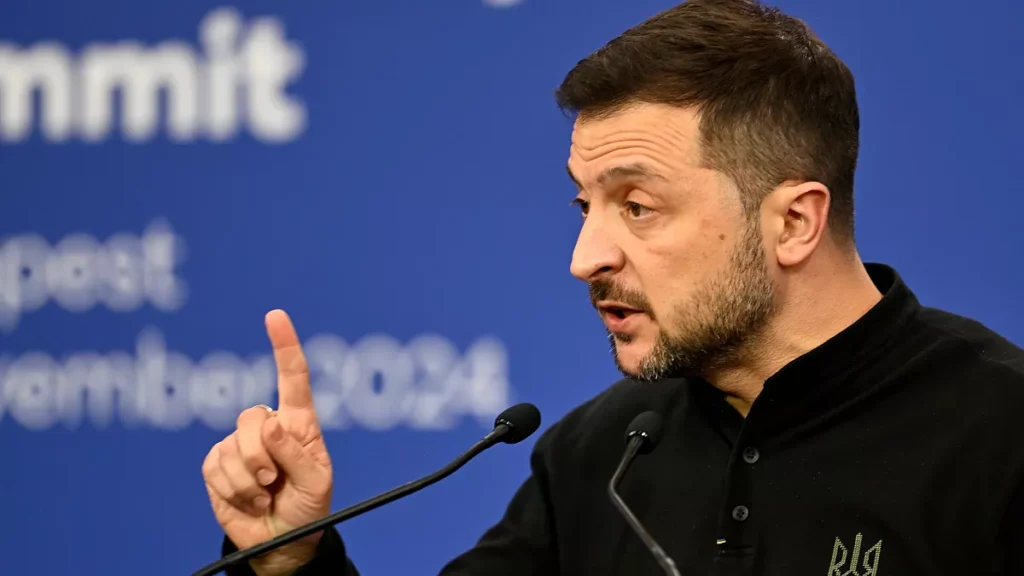Zelenskyy Proposes Ending Ukraine War in Exchange for NATO Membership, Despite Russia Retaining Seized Territories

Ukrainian President Volodymyr Zelenskyy has suggested a potential route to end the ongoing war with Russia, proposing that Ukraine could secure NATO membership even if Russia does not immediately return the territory it has seized since the conflict began. In an interview with Sky News’s chief correspondent, Stuart Ramsay, Zelenskyy discussed the possibility of reaching a ceasefire deal by offering NATO membership to parts of Ukraine that are not under Russian occupation. He emphasized that this offer would require NATO to recognize Ukraine’s internationally recognized borders.
The Ukrainian president’s comments came in response to media reports speculating about U.S. president-elect Donald Trump’s possible proposal to end the war. One of the reports suggested that Trump might recommend Ukraine cede control of the territories occupied by Russia in exchange for NATO membership. Zelenskyy, however, outlined his own terms for a potential peace agreement, stating that while he is open to the idea of NATO membership, it would have to apply to the unoccupied regions of Ukraine.
He explained that if NATO extended an invitation to Ukraine that recognized its internationally recognized borders, it could help end the “hot phase” of the war. This approach would mean that Ukraine would be able to join the alliance, effectively putting an end to the active fighting, while leaving the more complicated issue of Russia’s occupation of Ukrainian territory to be addressed through diplomacy at a later stage.
Zelenskyy acknowledged that this deal would not immediately resolve the situation in the eastern parts of Ukraine, which are currently controlled by Russia. These areas, such as parts of Donetsk and Luhansk, have been under Russian influence since 2014 and were further occupied during Russia’s full-scale invasion in February 2022. Zelenskyy’s remarks suggest that while he is willing to consider a ceasefire and a potential diplomatic resolution, he is not willing to compromise on Ukraine’s territorial integrity or sovereignty in the long term.
The idea of ending the war through a ceasefire agreement that includes NATO membership but does not immediately address Russia’s territorial occupation is a significant shift in Ukraine’s stance. It highlights the urgency of bringing an end to the fighting, which has caused immense suffering and destruction in the country. However, it also underscores Ukraine’s commitment to eventually regaining its lost territories and restoring its borders, even if that process takes place through diplomatic channels rather than military action.
Zelenskyy’s proposal comes at a time when the conflict is in a particularly challenging phase. Russian forces continue to hold substantial portions of Ukrainian territory, especially in the east, and the war has led to a staggering loss of life and infrastructure. The Ukrainian government, with strong backing from its Western allies, has made it clear that it will not accept any settlement that legitimizes Russia’s territorial gains.
However, the reality of the war’s prolonged nature and the mounting toll on Ukraine’s people and economy may require new approaches to peace negotiations. Zelenskyy’s openness to a deal that could freeze the conflict while still pursuing the return of occupied territories in the future indicates a pragmatic shift. This idea aligns with the broader goal of ending the war as soon as possible while keeping Ukraine’s long-term objectives intact.
The proposal also comes at a time of political uncertainty in the United States. With Trump’s presidential bid for 2024 gaining momentum, Zelenskyy’s comments may be a response to the speculation around Trump’s potential influence on U.S. foreign policy. Trump has previously expressed a desire to negotiate a peace deal with Russia, which has led some to believe that he might push for Ukraine to make territorial concessions in exchange for NATO membership.
In his interview, Zelenskyy seemed to reject the notion of ceding Ukrainian land to Russia in exchange for NATO membership. He made it clear that the territorial integrity of Ukraine was non-negotiable. However, by suggesting that NATO membership could be offered to unoccupied parts of Ukraine, Zelenskyy has proposed a way forward that could help bring an end to the war while leaving room for future diplomatic negotiations regarding the occupied territories.
This idea has the potential to reshape the dynamics of peace talks, offering a pathway that could reduce the immediate violence and allow for a longer-term resolution to the territorial disputes. However, the success of such an approach would depend on the willingness of both Russia and Ukraine to engage in meaningful diplomatic negotiations, and on the support of the international community, especially NATO and the United States.







